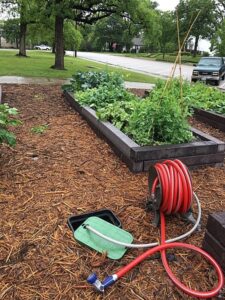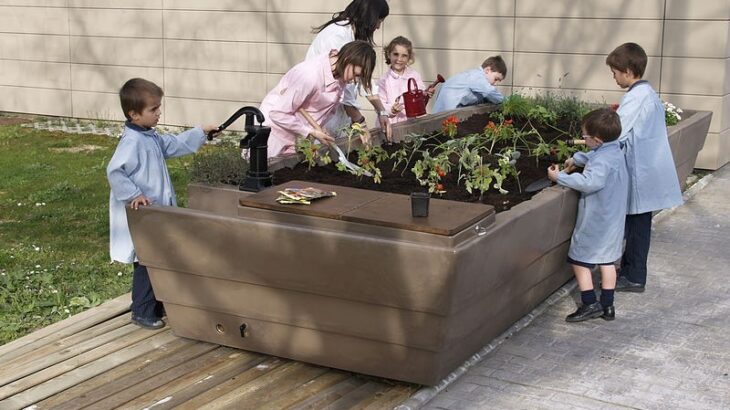By Ishara Yahampath, Communication, Education & Outreach editor
In schools across Canada, food gardens are a popular intervention to support learning and provide students with a deeper understanding of food systems, sustainable practices, and careers in food and agriculture. Waterloo Region School Food Gardens (WRSFG) have 35 food gardens in schools across the Waterloo region, providing students with hands-on opportunities to learn about horticulture, agriculture, and local food industries.
Waterloo Region School Food Garden Network

School garden water infrastructure. Image: Libby Kokes, CC-SA 4.0.
WRSFG began their work in 2017 with the garden grant program, which supported schools building a network of educators and communities interested in garden-based learning. The main objective of Waterloo Region School Food Gardens is to empower the next generation of agriculture and food experts by creating and maintaining gardens on school grounds while also providing garden education programs. This work is operated by Seeds of Diversity, a Canadian organization dedicated to preserving Canada’s seed biodiversity by growing and sharing seeds with others while preserving, conserving, and encouraging heirloom and endangered food crop cultivation. They currently have locations in Waterloo, Kitchener, Cambridge, Baden, New Dundee, and Elmira, and each of these gardens receives school garden grants funded by Seeds of Diversity. Selection for the food garden program is based on staff engagement, green space, and water availability in the schools. School strategies for student engagement, sustainability, and summer care are also considered.
Expected Benefits
Through their garden programs, WRSFG anticipate academic and social improvement, promotion of physical and mental health, and a significant positive community impact. By providing opportunities for experiential and interdisciplinary learning, they expect improved performances in environmental science, biology, mathematics, arts, and humanities. They also believe the program enables opportunities for relationship-building, social cohesion, collaboration, communication, and conflict resolution. In terms of physical and mental health, the program aims to boost knowledge, provide access to better nutrition, increase consumption of fresh fruits and vegetables, improve students’ connection to nature, and reduce stress. The project is also expected to encourage positive youth development, build community, and prepare students for emerging green industries such as farming, green construction, and waste management.
Positive Experiences
Many teachers, students, and parents have had positive experiences through the Waterloo Region School Food Gardens. According to Jenny Soehner, a Riverside primary school teacher, students start their outdoor time by checking on gardens to see if anything new is growing and watering plants. Harvesting fresh produce is also interesting for both teachers and students. As Blair Road primary school teacher, Brita Sherren, commented: “We are looking forward to the fall, harvesting carrots, cabbages, potatoes, and, if we are lucky, some pumpkins! It has been an amazing learning adventure so far, and we have only just begun”.

Kids watering plants. Image: Nasirun Khan, CC.
New Directions
With the COVID-19 pandemic in 2020 and 2021, Waterloo Region School Food Gardens shifted their focus to supporting youth in learning about food systems and sustainability in a virtual format. As a result, they developed an online youth volunteering program. The online program focuses on finding topics that interest and motivate young people and supports them in developing their inquiry skills, food system knowledge, and communication and career skills. The program also provides year-round opportunities for high school students to engage in meaningful roles in school garden projects as volunteers.
In addition to providing funding and support for school gardens, the project also provides select schools with Tower Gardens, NutriTowers, and indoor hydroponic systems for food production throughout the year. The project has expanded to include garden education programs with workshops led by facilitators in various locations around the Waterloo region. These workshops welcome all participants to discuss many topics related to gardening, such as plant identification, pest management, community development, and gardening basics.
Positive Outcomes
Produce from school food gardens is sold in the Youth Food Market, a student-run initiative, providing fresh, locally grown and affordably priced produce to the Waterloo region community each summer. Additionally, lots of fresh produce is donated to underprivileged people in the Waterloo region through the help of Youth Food Market. The Youth Food Market supports local food systems while giving young people the opportunity to understand and apply business and agricultural concepts. The project tries to expand their work and network by inviting more high school students to become involved in the project as volunteers.
School food gardens are becoming an increasingly common resource for educators and students in Waterloo Region. This developing food garden movement enhances learning opportunities, academic performance, and the health and wellbeing of students while providing them with a safe environment to learn and grow.
Feature image: Students working on plant beds. Image: Lalobiozar, CC-SA 4.0.




